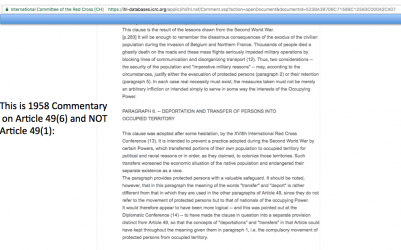Shusha
Gold Member
- Dec 14, 2015
- 14,388
- 2,769
- 290
New paper indicates that settlement activity is not a violation of the Geneva Conventions.
A new paper entitled "Unsettled: a Global Study of Settlements in Occupied Territory" examines every single instance of settlements in occupied territory and finds in no case is it recognized as illegal -- except Israel -- even where the occupying governmental power actively recruits, encourages, builds, and finances the settlements and the migration of "desired" people to those settlements.
First, the migration of people into occupied territory is a near-ubiquitous feature of extended belligerent occupations. Second, no occupying power has ever taken any measures to discourage or prevent such settlement activity, nor has any occupying power ever expressed opinio juris suggesting that it is bound to do so. Third, and perhaps most strikingly, in none of these situations have the international community or international organizations described the migration of persons into the occupied territory as a violation of Art. 49(6). Even in the rare cases in which such policies have met with international criticism, it has not been in legal terms. This suggests that the level of direct state involvement in “transfer” required to constitute an Art. 49(6) violation may be significantly greater than previously thought. Finally, neither international political bodies nor the new governments of previously occupied territories have ever embraced the removal of illegally transferred civilian settlers as an appropriate remedy.
...
It isn't just double standards. It is that the international community has created an artificial international law to apply only to Israel, even though that law simply doesn't exist in other contexts. Not that it exists and is ignored - it doesn't exist. When legal critics give their laundry lists of violations of international law by belligerent occupiers, they simply do not consider settlement activity to be illegal.
This is an extraordinarily important paper that not only reveals much about international law, but also about how much of what people call international law in context of Israel is simply a lie.
A new paper entitled "Unsettled: a Global Study of Settlements in Occupied Territory" examines every single instance of settlements in occupied territory and finds in no case is it recognized as illegal -- except Israel -- even where the occupying governmental power actively recruits, encourages, builds, and finances the settlements and the migration of "desired" people to those settlements.
First, the migration of people into occupied territory is a near-ubiquitous feature of extended belligerent occupations. Second, no occupying power has ever taken any measures to discourage or prevent such settlement activity, nor has any occupying power ever expressed opinio juris suggesting that it is bound to do so. Third, and perhaps most strikingly, in none of these situations have the international community or international organizations described the migration of persons into the occupied territory as a violation of Art. 49(6). Even in the rare cases in which such policies have met with international criticism, it has not been in legal terms. This suggests that the level of direct state involvement in “transfer” required to constitute an Art. 49(6) violation may be significantly greater than previously thought. Finally, neither international political bodies nor the new governments of previously occupied territories have ever embraced the removal of illegally transferred civilian settlers as an appropriate remedy.
...
It isn't just double standards. It is that the international community has created an artificial international law to apply only to Israel, even though that law simply doesn't exist in other contexts. Not that it exists and is ignored - it doesn't exist. When legal critics give their laundry lists of violations of international law by belligerent occupiers, they simply do not consider settlement activity to be illegal.
This is an extraordinarily important paper that not only reveals much about international law, but also about how much of what people call international law in context of Israel is simply a lie.
